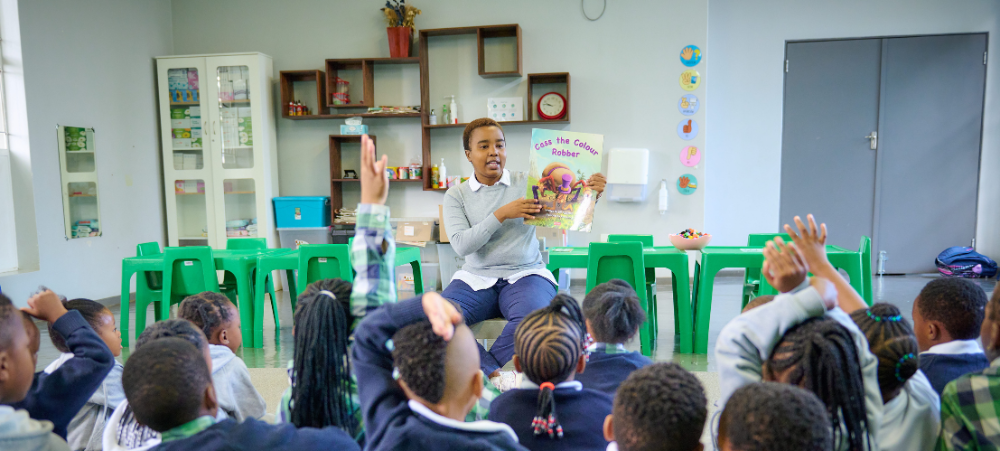South Africa faces a significant literacy crisis in children under the age of 10. Despite efforts to improve educational outcomes, a new report from the 2030 Reading Panel has found that most children leave grade one without knowing the alphabet, while 82% of children cannot read for meaning by the time they reach Grade 4. While teachers are essential in imparting knowledge and nurturing academic skills, parents possess a unique advantage of being intimately involved in their child’s day-to-day life. By actively working on literacy with their children, parents can create a supportive learning environment that complements the efforts of teachers.
“The first five years of life, when the brain is developing and maturing, is the most intensive period for acquiring the speech and language skills necessary for literacy later in life. These skills develop best in a world that is rich with sounds, sights and consistent exposure to the speech and language of others. It is for this reason that pre-school forms such a crucial part of your child’s developmental journey. But it is not the responsibility of teachers alone to help children develop these skills,” says Mampho Langa, Head of Schools at Future Nation Schools (FNS), “parents play a crucial role in this too. In this article, we share some of practical steps, inspired by ta combination of project-based learning, learn-to-play and Montessori pre-school teaching methodologies we use here at FNS, that parents can use to boost literacy rates during the pre-school years and set their children up for lifelong academic and personal success.”
1. Nurture your child’s curiosity
Project-based learning (PBL) promotes curiosity and prompts learners to gather information, analyse it and arrive at conclusions based on evidence. This makes it an effective approach to engage children in meaningful, hands-on activities that promote literacy buy encouraging your child to explore topics that they are interested in and create projects around them. For example, if your child loves animals, you can help them research different animal species, create a mini zoo with toy animals, ask them questions that prompt them to think about animals differently (like why zebras have stripes) and then read books to them that answer those questions. In so doing, these PBL techniques will develop your child’s comprehension skills while nurturing their curiosity and creativity.
2. Make learning tangible and multisensory
PBL emphasises a child-centred approach to education that empowers children to take an active role in their learning journey. One of the key ways this is done at a pre-school level is by incorporating a wide range of materials that promote language development. For instance, use textured materials for tracing letters, engage in sensory play with letter-shaped sand, or encourage your child to write words in shaving cream. These multisensory experiences reinforce letter recognition, fine motor skills and memory recall, making the learning process more engaging and effective.
3. Foster a love for independent reading
Independent exploration and self-directed learning is a key component of project-based learning. By simply engaging with books, your child embarks on a journey of appreciating literature and narratives, igniting their imagination and nurturing their curiosity.
Encourage your child to engage in independent reading by creating a literacy-friendly environment. Set up a cosy reading nook with a bookshelf containing a variety of age-appropriate books. Encourage your child to choose their own books in order to foster their independence and personal preferences. Describing pictures in the book, explaining the meaning of the story and encouraging the child to talk about what has been read to them and to ask questions will not only improve their understanding of the world and their social skills but it will enhance their literacy skills as well.
4. Encourage collaboration and language development:
Collaboration and effective communication are essential skills emphasised in PBL education. Encourage your child to engage in group activities that promote language development and social interaction. Set up playdates with peers, engage in shared storytelling sessions, or organize mini-group projects where children work together to create a story or a book. Collaboration enhances language skills, vocabulary development and critical thinking abilities.
5. Connect literacy with real-life experiences
PBL education emphasise the importance of connecting learning with real-life experiences. Help your child make meaningful connections between literacy skills and their everyday life. For example, while grocery shopping, ask your child to help you find items on a shopping list or read labels to you. Encourage them to illustrate their own recipes or create a menu for a pretend restaurant. By linking literacy to practical experiences, children develop a deeper understanding and appreciation for reading and writing.
“There you have it”, concludes Langa, “five simple ways that you can incorporate aspects of project-based learning, learn-to-play and Montessori pre-school teaching into your child’s day-to-day activities that can greatly enhance their child’s literacy skills during the preschool years. By embracing hands-on projects, promoting independent reading, utilising multisensory approaches, fostering collaboration, and connecting literacy with real-life experiences, you can create a vital foundation for your child’s lifelong love of reading and learning.”
Literacy skills are one of the five areas that schools test for when assessing whether a pre-school child is ready to go to primary school. At 6pm on 29 August 2023, Future Nation Schools will be hosting a free virtual talk about School Readiness Assessments for parents and guardians interested in finding out more about this vital step in their child’s education journey. Book your seat for this talk here.
About Future Nation Schools
Founded in 2017 by Sizwe Nxasana and Dr Judy Dlamini, Future Nation Schools are a network of independent schools that aim to lead the African Education Revolution through relevant, futuristic, Africa-focused and technology-enabled education.
Future Nation Schools, which has campuses in Fleurhof and Lyndhurst, offers quality, affordable, African-centred education for Pre-School, Primary and High School. The curriculum comprises an enhanced National CAPS curriculum, delivered through Project Based Learning, and an IEB examination in Grade 12.




